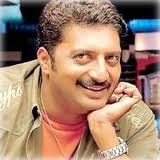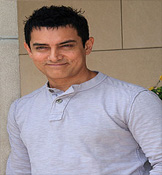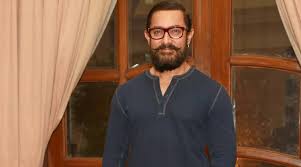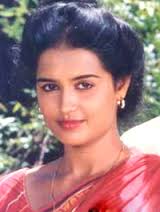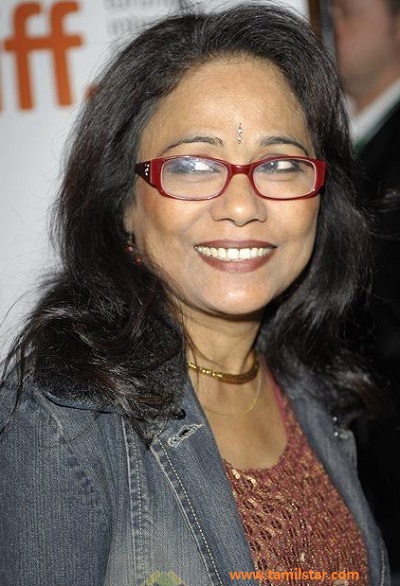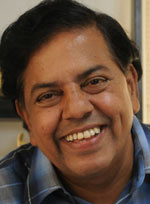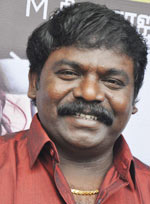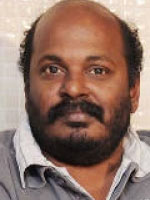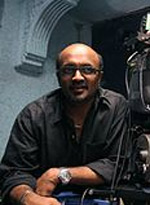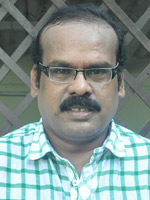
Showing all artists born in 1965
Prakash Raj
Prakash Rai (born 26 March 1965), better known by his stage name Prakash Raj, is a National Award winning Indian film actor, director and producer who has worked in Kannada, Tamil, Telugu, Malayalam and Hindi films. He entered Tamil film industry, after a slow and unsuccessful career in Kannada Cinema, through K. Balachander in his movie Duet (1994). In remembrance, he named his production company "Duet Movies".
He has played a variety of roles, most notably as the antagonist in Kannada, Telugu Tamil and Malayalam and of late, as a character actor. He is considered to be one amongst the club of natural actors. He has won a National Film Award for Best Supporting Actor in 1998 for Mani Ratnam's Iruvar and a National Film Award for Best Actor in 2009 for his role in Kanchivaram, a Tamil film directed by Priyadarshan.
Prakash m... See full bio
He has played a variety of roles, most notably as the antagonist in Kannada, Telugu Tamil and Malayalam and of late, as a character actor. He is considered to be one amongst the club of natural actors. He has won a National Film Award for Best Supporting Actor in 1998 for Mani Ratnam's Iruvar and a National Film Award for Best Actor in 2009 for his role in Kanchivaram, a Tamil film directed by Priyadarshan.
Prakash m... See full bio
Known For:
Viduthalai
, Annaatthe
, Velaikkaran
, Avargal
, Sathuranga Vettai 2
, Yaakkai
, Sila Samayangalil
, Kadavul Irukaan Kumaru
, KO-2
, Manithan
, Thozha
, Bangalore Naatkal
, Kalavaadiya Pozhuthugal
, Thoonga Vanam
, Rudhramadevi
, Ok Kanmani
, JK Enum Nanbanin Vaazhkai
, Bhooloham
, Yaan
, Un Samayal Arayil
, Production No 5
, Thulli Vilayadu
, Gouravam
, Chennaiyil Oru Naal
, Saguni
, Dhoni
, Mambattiyan
, Rowthiram
, Venghai
, Engeyum Kadhal
, Ponnar Shankar
, Magizhchi
, Singam
, Theeradha Vilaiyattu Pillai
, Malai Malai
, Thoranai
, Villu
, Abhiyum Naanum
, Pandhayam
, Kanchivaram
, Saroja
, Arai Enn 305-il Kadavul
, Santosh Subramaniam
, Velli Thirai
, Bheemaa
, Aarya
, Veerappu
, Viyabari
, Sabari
, Mozhi
, Pokkiri
, Thiruvilaiyaadal Aarambam
, Perarasu
, Vettaiyaadu Vilaiyaadu
, Parijatham
, Thalai Nagaram
, Idhaya Thirudan
, Aadhi
, Paramasivan
, Saravana
, Sivakasi
, Anniyan
, Arinthum Ariyamalum
, Aadum Koothu
, Ayya
, M. Kumaran S/O Mahalakshmi
, Vasool Raja MBBS
, Ghilli
, Chokka Thangam
, Kannathil Muthamittal
, Dhaya
, Alli Thandha Vaanam
, Rishi
, Vaanchinathan
, Vaanavil
, Chinna Chinna Kannile
, Appu
, En Swasa Kaatre
, Senthooram
, Guru Paarvai
, Sollamale
, Sandhippoma
, Kavalai Padathe Sagodhara
, Santhosham
, Swarnamukhi
, Nerrukku Ner
, V.I.P
, Iruvar
, Raasi
, Aravindhan
, Minsara Kanavu
, Kalki
, Subash
, Priyam
, Seethanam
, Bombay
, Nila
, Duet
Aamir Khan
Aamir Hussain Khan (born 14 March 1965) is an Indian film actor, director and producer who
has established himself as one of the leading actors of Hindi cinema. Starting his career as a child actor in his uncle Nasir Hussain's film Yaadon Ki Baaraat (1973), Khan began his professional career eleven years later with Holi (1984) and had his first commercial success with Qayamat Se Qayamat Tak (1988). He received his first National Film Award (Special Jury Award) for his roles in the films Qayamat Se Qayamat Tak (1988) and Raakh (1989). After eight previous nominations during the 1980s and 1990s, Khan received his first Filmfare Award for Best Actor for his performance in the major grosser Raja Hindustani (1996) and later earned his second Best Actor award for his performance in the Academy Award-nominated Lagaan, which also marked the debut of his own prod...
See full bio
Known For:
3 idiots
Aamir Khan
Aamir Khan ( born Mohammed Aamir Hussain Khan on 14 March 1965) is an Indian film actor, director, and producer. Through his career in Hindi films, Khan has established himself as one of the most popular and influential actors of Indian cinema. He is the recipient of numerous awards, including four National Film Awards and eight Filmfare Awards. He was honoured by the Government of India with the Padma Shri in 2003 and the Padma Bhushan in 2010.
Khan first appeared on screen as a child actor in his uncle Nasir Hussain's film Yaadon Ki Baaraat (1973). His first feature film role came with the experimental film Holi (1984), and he began a full-time acting career with a leading role in the tragic romance Qayamat Se Qayamat Tak (1988). His performance in the film and in the thriller Raakh (1989) earned him a Special Mention at the National... See full bio
Khan first appeared on screen as a child actor in his uncle Nasir Hussain's film Yaadon Ki Baaraat (1973). His first feature film role came with the experimental film Holi (1984), and he began a full-time acting career with a leading role in the tragic romance Qayamat Se Qayamat Tak (1988). His performance in the film and in the thriller Raakh (1989) earned him a Special Mention at the National... See full bio
Known For:
Dangal
Chithra
Chitra (சித்ரா) is an Indian film actress best known for her work in "Malayalam cinema". Shes has acted in more than 100 films. She acted opposite Mohanlal in her first film Attakalasham.
Seema Biswas
Seema Biswas (born 14 January 1965) is an Indian film and theatre actress from Assam who shot into prominence with the role of Phoolan Devi in Shekhar Kapur's film Bandit Queen (1994). She has a reputation for performing strong character roles. Biswas won the 1996 National Film Award for Best Actress for her role in the film Bandit Queen. She won the 2000 Sangeet Natak Akademi Award and the 2006 Best Actress Genie Award for her role as Shakuntala in Deepa Mehta's Water (2005).
Personal life and education
Biswas was born in Nalbari, Assam, to Bengali Parents Jagdish Biswas and Meera Biswas. Her mother, an early influence, was a history teacher and a pioneering figure for female theatre artistes in Assam; and she came into contact with artists like Bhupen Hazarika, Phani Sarma and Bishnuprasad Rabha early in life. She st... See full bio
Personal life and education
Biswas was born in Nalbari, Assam, to Bengali Parents Jagdish Biswas and Meera Biswas. Her mother, an early influence, was a history teacher and a pioneering figure for female theatre artistes in Assam; and she came into contact with artists like Bhupen Hazarika, Phani Sarma and Bishnuprasad Rabha early in life. She st... See full bio
Known For:
Iyarkai
Swaminathan
Swaminathan also known as Lollu Sabha Swaminathan is an Indian actor working in the Tamil film and media industry. He appeared in prominent roles in Vijay TV's satiric series Lollu Sabha before becoming a full fledged actor in Tamil films. He frequently collaborates with Santhanam as a comedian . Swaminathan resides in K. K. Nagar, Chennai.
Imman Annachi
Imman Annachi is a Tamil film actor and television presenter, who has appeared in character roles. He made his breakthrough as a presenter on the Sun TV network, hosting shows including Solluganne Sollunga and Kutty Chutties.
Imman Annachi made his debut hosting a shot in Makkal TV but he made his breakthrough in Solluganne Sollunga on Adithya TV before moving on to work on the children's TV show Kutty Chutties on Sun TV.
He began to play more pivotal roles in films after a series of one scene appearances, notably featuring in Neerparavai (2012) and then in the Dhanush starrers Maryan and Naiyaandi (2013). Additionally, the actor also has played a minor role in Vijays "Vettaikaaran".The actor has several releases lined up for 2014, portraying a full-length role of a comedy cop in Adhu Vera Idhu Vera, while portraying a pivotal... See full bio
Imman Annachi made his debut hosting a shot in Makkal TV but he made his breakthrough in Solluganne Sollunga on Adithya TV before moving on to work on the children's TV show Kutty Chutties on Sun TV.
He began to play more pivotal roles in films after a series of one scene appearances, notably featuring in Neerparavai (2012) and then in the Dhanush starrers Maryan and Naiyaandi (2013). Additionally, the actor also has played a minor role in Vijays "Vettaikaaran".The actor has several releases lined up for 2014, portraying a full-length role of a comedy cop in Adhu Vera Idhu Vera, while portraying a pivotal... See full bio
Known For:
Theal
, Singam 3
, Thodari
, Anjala
, Kathakali
, 10 Endrathukulla
, Palakkattu Madhavan
, Kaaval
, Puli
, Kaaki Sattai
, Sandamarutham
, Nee Yellam Nalla Varuvada
, Rombha Nallavan Da Nee
, Pattaya Kelappanum Pandiya
, Goli Soda
, Maryan
, Baana Kaathadi
Singampuli
Singampuli is a Tamil film actor and director. After making Red (2002) and Maayavi (2005), he has made a career appearing in supporting roles in films. He is a close relative of former Tamil Nadu Chief minister O. Panneerselvam.
Singampuli was born and brought up in Theni, Periyakulam and after studying engineering in Bangalore, he arrived in Chennai looking for a career in films. During his stint as an assistant director with Sundar C, Singampuli suggested the original plot point of Unnaithedi to the director and Sundar wrote the script of the film within a week, before discussing the line with actor Ajith Kumar. Ajith was initially unimpressed but agreed to do the romantic story anyway, mentioning that if the film became a success he would feature in a future film to be directed by Singampuli. Subsequently he agreed terms to work in the 2002 ac... See full bio
Singampuli was born and brought up in Theni, Periyakulam and after studying engineering in Bangalore, he arrived in Chennai looking for a career in films. During his stint as an assistant director with Sundar C, Singampuli suggested the original plot point of Unnaithedi to the director and Sundar wrote the script of the film within a week, before discussing the line with actor Ajith Kumar. Ajith was initially unimpressed but agreed to do the romantic story anyway, mentioning that if the film became a success he would feature in a future film to be directed by Singampuli. Subsequently he agreed terms to work in the 2002 ac... See full bio
Known For:
Raajavamsam
, Muthuramalingam
, Yaakkai
, Jeyikkira Kuthira
, Kadavul Irukaan Kumaru
, Aandavan Kattalai
, Sowkarpettai
, Sethu Boomi
, Naalu Policeum Nalla Irundha Oorum
, Sagaptham
, Vellaikaara Durai
, Kaaviya Thalaivan
, Kaadu
, Appuchi Gramam
, Jannal Oram
, Desingu Raja
, Mayandi Kudumbathar
, Naan Kadavul
, Maayavi
Ravi K. Chandran
Ravi K. Chandran is an Indian cinematographer. He has frequently collaborated with leading Indian filmmakers like Priyadarshan, Shaji Kailas, Mani Ratnam, Rajiv Menon, Sanjay Leela Bhansali and A. R. Murugadoss. Ravi has won two Filmfare Awards and one Southern Filmfare Award during his career.
Ravi K. Chandran was born in the village Maduranthakam, Tamil Nadu as the youngest child. Following graduating from the A. M. Jain College in 1982, Ravi K. Chandran started his career in the film industry. In addition to this, he works as the Director of Photography of many music videos and ad films. He began his career by assisting his brother, K. Ramachandra Babu and later turned into an independent cinematographer in 1992 by filming Kilukkampetti, a Malayalam film directed by Shaji Kailas. Later he donned camera for a more Shaji Kailas directorials incl... See full bio
Ravi K. Chandran was born in the village Maduranthakam, Tamil Nadu as the youngest child. Following graduating from the A. M. Jain College in 1982, Ravi K. Chandran started his career in the film industry. In addition to this, he works as the Director of Photography of many music videos and ad films. He began his career by assisting his brother, K. Ramachandra Babu and later turned into an independent cinematographer in 1992 by filming Kilukkampetti, a Malayalam film directed by Shaji Kailas. Later he donned camera for a more Shaji Kailas directorials incl... See full bio
Known For:
Yaan
A. Venkatesh
A. Venkatesh is a Tamil film director born in Tuticorin, Tamil Nadu.
Initially, he worked as an assistant to director K. Rajeshwar in Nyaya Tharasu (1989) and Idhaya Thamarai (1990). He assisted Pavithran in Vasanthakala Paravai (1991) and Suriyan (1992), then he was an associate director to director Shankar in Gentleman (1993) and Kadhalan (1994). During the shooting of the film Kadhalan, producer G. K. Reddy approached him to direct a film. In 1996, he made his directional debut through Mahaprabhu starring R. Sarathkumar, Sukanya and Vineetha. He is known for directing films in short spans of times. He has also acted in various Tamil movies, Angadi Theru being one among them. He also appeared in Vijay TV's special program celebrating the film Nanban's success, and was seen sharing his experiences working as an associate with Director Shankar.
Initially, he worked as an assistant to director K. Rajeshwar in Nyaya Tharasu (1989) and Idhaya Thamarai (1990). He assisted Pavithran in Vasanthakala Paravai (1991) and Suriyan (1992), then he was an associate director to director Shankar in Gentleman (1993) and Kadhalan (1994). During the shooting of the film Kadhalan, producer G. K. Reddy approached him to direct a film. In 1996, he made his directional debut through Mahaprabhu starring R. Sarathkumar, Sukanya and Vineetha. He is known for directing films in short spans of times. He has also acted in various Tamil movies, Angadi Theru being one among them. He also appeared in Vijay TV's special program celebrating the film Nanban's success, and was seen sharing his experiences working as an associate with Director Shankar.
Known For:
Nethra
, Thodari
, Aandavan Kattalai
, Sivappu
, Sandamarutham
, Killadi
, Rombha Nallavan Da Nee
, Summa Nachunu Irukku
, Sattapadi Kutram
, Vallakottai
, Maanja Velu
, Angadi Theru
, Malai Malai
, Durai
, Aai
, Kuththu
, Dum
, Bagavathi
, Selva
, Nilaave Vaa

